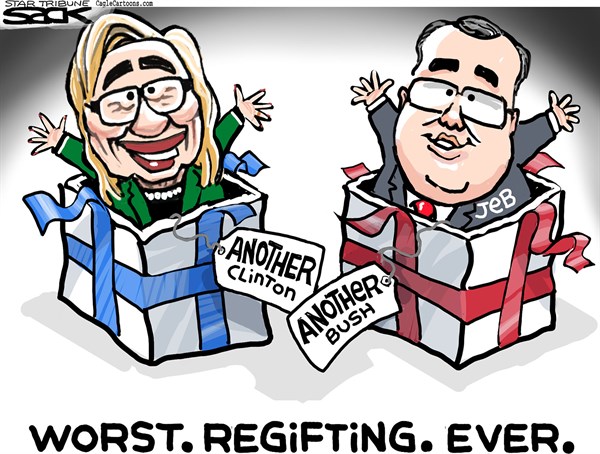
In January 2007, shortly after entering the race for the 2008 Democratic presidential nomination, Hillary Clinton traveled to Iowa, where one of the first questions she faced was about her vote to authorize the war in Iraq.
"If we had known then what we know now, there never would have been a vote," Clinton said, "and I never would have voted to give (President George W. Bush) that authority."
Clinton had been saying that since 2004. As she ramped up her campaign, she said it more and more. "If I had known then what I know now, I never would have voted to give the president authority," Clinton said at a Democratic debate in June 2007. "Obviously, if I had known then what I know now about what the president would do with the authority that was given him, I would not have voted the way that I did," she said on "Meet the Press" in September 2007.
It didn't work. Democrats, and some in the press, demanded more. They wanted Clinton to acknowledge that she had made a grievous error that went far beyond simply believing intelligence that turned out to be false. They wanted Clinton to say she had made a huge mistake and deeply regretted her actions. They wanted her to grovel.
"She uttered the most irritating and disingenuous nine words in politics: 'If we had known then what we know now,'" wrote New York Times columnist Maureen Dowd of Clinton during that 2007 Iowa visit. "(Democratic Sen.) Jim Webb knew. Barack Obama knew. Even I knew, for Pete's sake. The administration's trickery was clear in real time." Dowd's conclusion, and that of many on the left, was that Clinton didn't have the guts to stand up to a popular president.
Still, Clinton resisted a full-scale confession. She ended up paying a heavy price, losing the nomination to Obama, who had not been in Congress at the time and had the luxury of saying he opposed the Iraq war all along.
But Clinton knew she had to confess sometime. In her 2014 book "Hard Choices," she wrote that she not only regretted her vote, she regretted not regretting it earlier:
"While many were never going to look past my 2002 vote no matter what I did or said, I should have stated my regret sooner and in the plainest, most direct language possible. I'd gone most of the way there by saying I regretted the way President Bush used his authority and by saying that if we knew then what we later learned, there wouldn't have been a vote. But I held out against using the word 'mistake.' It wasn't because of political expediency. After all, primary voters and the press were clamoring for me to say that word. When I voted to authorize force in 2002, I said that it was 'probably the hardest decision I have ever had to make.' I thought I had acted in good faith and made the best decision I could with the information I had. And I wasn't alone in getting it wrong. But I still got it wrong. Plain and simple."
In recent days, Jeb Bush has struggled to answer the if-I-knew-then-what-I-know-now question about Iraq. Bush stumbled through three or four tries before finally saying that if he had known what would happen, "I would not have gone into Iraq."
That should be enough. Unlike Hillary Clinton, Jeb Bush did not vote to authorize the war. Unlike Clinton, he was not privy to the secret intelligence used to justify invading Iraq. Unlike Clinton, he did not give a speech from the Senate floor in support of authorization.
Jeb Bush faced intense questioning on Iraq mostly because it was his brother who started the war, and many voters quite reasonably want to know how a President Jeb Bush would be different from President George W. Bush. Jeb really could not get away with not answering.
Now that he has answered, it seems likely that criticism he received from conservatives will subside. But attacks from the Left will increase.
Just moments after Jeb's final statement, the liberal writer Josh Marshall wrote: "It won't end there. Because with a consensus in place that the Iraq War was a bad idea, the whys and hows of just how we made this decision are up for discussion in a very new way." An hour or so later, the Democratic National Committee announced a conference call to "hold Jeb Bush accountable on Iraq."
In other words, Bush's I-would-not-have-gone-into-Iraq answer immediately transformed the debate into a partisan one. Conservatives who criticized Jeb's earlier flubbed answers will likely say he's done enough. The Left will keep pressing for more -- just like they pressed Clinton. But of course, Jeb has no Iraq vote to regret.
Besides, in the end it seems unlikely the public is interested in a full replay of the 2002-2003 Iraq war debate. Bush made a commonsense statement.
That's probably enough for most voters.
Comment by clicking here.



 Contact The Editor
Contact The Editor
 Articles By This Author
Articles By This Author